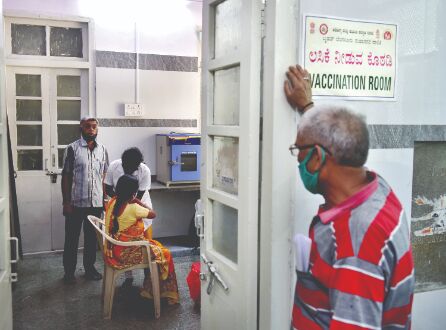Covid review meet: 11 states, UTs asked to take measures

New Delhi: With the rising number of daily cases of Coronavirus, the Centre marked 11 states and Union Territories as 'states of grave concern'–Maharashtra, Punjab, Karnataka, Kerala, Chhattisgarh, Chandigarh, Gujarat, Madhya Pradesh, Tamil Nadu, Delhi and Haryana, contributing to the maximum burden of the disease. In his meeting with chief secretaries of states and UTs on Friday, Cabinet Secretary Rajiv Gauba underlined the seriousness of the current pandemic situation in the country.
An official statement mentioned that "11 States/UTs were categorised as "States of grave concern on account of their high and rising daily case and higher daily deaths. These have contributed 90 per cent of COVID cases (as of 31st March) and 90.5 per cent of deaths (as of 31st March) in the last 14 days, and have crossed or close to crossing their early reported peaks during last year."
As the daily positives in the country jumped by over 12 per cent in the past 24 hours, Gauba expressed his deep concern over such a "scary scenario", "at the brink of a very bad situation" and "very very alarming deterioration" to underline that states need to step up contact tracing and containment even as vaccinations continue.
The Centre advised to take up immediate and high effective measures to ensure containment of active cases and daily deaths through adherence to the standard Clinical Management Protocol shared earlier with all states and UTs.
Another worrisome aspect pointed out was that Tier 2 and Tier 3 cities along with peri-urban areas have recorded the recent high rise in COVID cases and especially, the spread of infection from these areas to the rural areas with weak health infrastructure would overwhelm the local administration was also highlighted.
The states were specifically asked to increase the testing continuously to ensure that positivity comes down to 5 per cent or less than 5 per cent, ensuring RT-PCR tests comprise 70 per cent of total tests, reducing the waiting time of test results with regular review with testing labs, use Rapid Antigen Tests (RAT) as a screening test in densely populated areas and where fresh clusters are emerging, all symptomatic RAT negatives to be mandatorily subjected to RT-PCR tests, ensuring effective and prompt isolation of those infected in institutional facilities (Covid Care Centres), ensuring that patients isolated at home are to be monitored daily.
Isolation of infected persons to be transferred immediately to health facilities, if required, to ensure that 25 to 30 such close contacts be traced for each infected person. Tracing of close contacts and their isolation to be done in 72 hours. Subsequent testing and follow up of all close contacts to be carried out and setting up of Containment Zones or Micro Containment Zones to break the chain of transmission.
Through a detailed and comprehensive presentation, the Union Health Secretary Rajesh Bhushan highlighted the current trajectory of Covid-19 in the States/UTs while Union Secretary (I&B) showcased ways of effective Behavioural Change Communication to instil COVID Appropriate Behaviour among the populace. Member (Health) NITI Aayog Dr V. K. Paul emphasized the need for States to follow a protocol for sharing clinical and epidemiological data for a more detailed study of the mutant strain of the virus for genome sequencing.
States have also also asked to examine Case Fatality Rate hospital-wise, devise an appropriate strategy and mitigate concerns regarding late admission in hospitals and non-adherence to National Clinical Management Protocol. The need to formulate District Action Plans with a focus on mapping of cases, reviewing of the ward and block wise indicators, 24X7 Emergency Operations Center, Incident Command System (Area Specific Rapid Response Team and Timely Sharing of information was stressed upon.
To minimize the daily fatalities, the states are advised to strengthen public and private healthcare resources. During the meeting, they were specifically asked to increase the number of isolation beds, oxygen beds, ventilators/ICU beds as per requirement, adequate oxygen supply, strengthening ambulance service and reduce response time and refusal rate with regular monitoring by the local administration, ensuring the adequate number of contractual staff and optimum rostering of duties, regular teleconsultation of ICU doctors at the districts with AIIMS, New Delhi Core Team or State Core Team. Tele-consultation is being conducted by AIIMS, New Delhi twice a week on Tuesdays and Fridays and strict enforcement of COVID Appropriate Behaviour (CAB) was reiterated.



